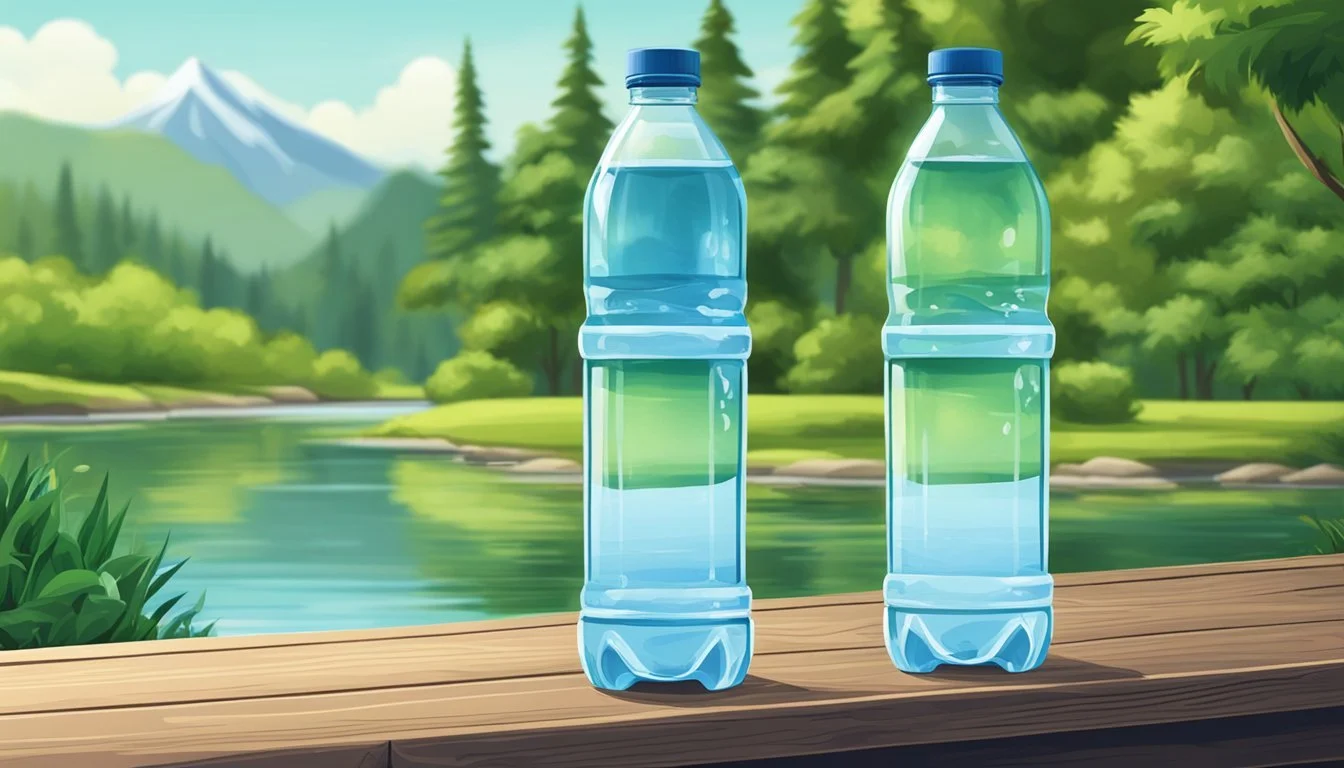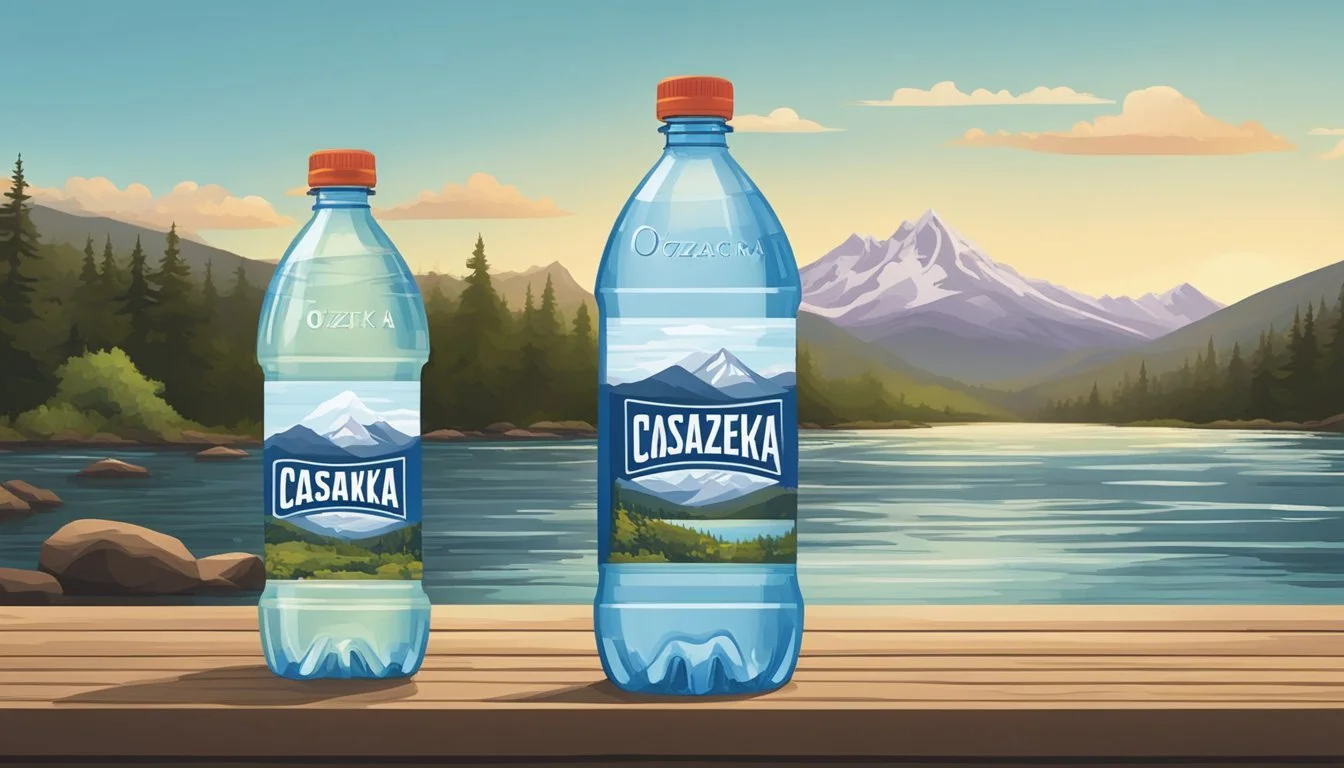Ozarka vs. Cascade Mountain
Comparing Bottled Water Brands
When choosing between Ozarka and Cascade Mountain bottled water, consumers seek the best in terms of purity, taste, and overall hydration benefits. For those prioritizing a clean and slightly sweet taste, Cascade Mountain stands out, offering a velvety texture and a hint of mineral richness. On the other hand, Ozarka, known for its crisp and refreshing profile, sources its water from springs in Texas, appealing to those who prefer a straightforward, clean drink.
Both brands cater to different aspects of hydration needs. Cascade Mountain garners praise for its ultra-light and smooth experience, which makes it a favorite among bottled water connoisseurs. Ozarka prides itself on consistency and reliability, making it a trusty companion for daily hydration.
Choosing the better option ultimately comes down to personal preference. Some may be drawn to the unique mineral quality of Cascade Mountain, while others might favor the no-frills, refreshing nature of Ozarka.
Understanding Bottled Water
Bottled water comes in various types, each with unique sourcing, filtration processes, and regulations. These distinctions influence both taste and safety, providing different health benefits and considerations for consumers.
Types of Bottled Water
Spring Water: Sourced from underground formations, spring water must flow naturally to the earth's surface. Brands like Ozarka often highlight their local Texas sources.
Purified Water: Typically derived from tap water, it undergoes filtration methods like reverse osmosis. Cascade Mountain offers this type, ensuring a high purity level.
Mineral Water: Contains dissolved minerals like calcium and magnesium, offering a distinct taste and potential health benefits. For example, San Pellegrino provides mineral water with natural carbonation.
Sparkling Water: Carbonated either naturally or artificially. Sparkling water is often selected for its effervescence.
Bottled Water Regulations
FDA Regulations: The Food and Drug Administration oversees bottled water safety, requiring compliance with standards for contaminants.
EPA Standards: While the Environmental Protection Agency regulates municipal water, its standards often influence bottled water regulations.
International Bottled Water Association (IBWA): Ensures member companies follow strict guidelines, promoting safety and quality.
Stringent regulations ensure that both Ozarka and Cascade Mountain maintain high standards, providing safe drinking water to consumers.
The Bottling Process
Filtration Process: Involves multiple stages like sediment filtration and activated carbon to remove impurities.
Mineral Addition: For purified and mineral waters, essential minerals may be added back for taste and health benefits.
Bottles and Packaging: Typically made from PET plastic, which is lightweight and recyclable. Some brands, like Cascade Mountain and Ozarka, focus on eco-friendly practices.
Each step in the process—from sourcing to packaging—aims to preserve water quality and ensure safety. Understanding these elements helps consumers make informed choices about their bottled water preferences.
Brand Profiles
This section provides an in-depth look at the brand profiles of Ozarka and Cascade Mountain. It focuses on their origins, sourcing practices, and how they compare to each other and other popular bottled water brands.
Ozarka: Texas's Natural Spring Water
Ozarka sources its water from natural springs located in Texas. The brand emphasizes local sourcing, marketing itself as a regional product. This local connection can be appealing to consumers who prefer products with a smaller environmental footprint.
Ozarka water undergoes a multi-step filtration process that ensures its quality and purity. The packaging is often seen as more straightforward and utilitarian compared to more premium brands, directly reflecting its focus on affordability.
In comparison to brands like Fiji or Evian, which source from exotic locations, Ozarka's appeal lies in its regional, natural spring sourcing. It offers a reliable option for those who prefer locally sourced bottled water.
Cascade Mountain: Purity From the Source
Cascade Mountain boasts of its water purity, sourced directly from natural springs in the Cascade Range. The brand highlights minimal processing to maintain the water's natural minerals and taste. This emphasis on purity appeals to health-conscious consumers who prioritize natural elements in their bottled water.
Packaging for Cascade Mountain is designed to evoke the pristine nature of its source, with sleek and minimalist designs. This aligns it more closely with premium brands like Voss and Smartwater.
Compared to mass-market options like Dasani and Aquafina, Cascade Mountain positions itself as a higher-end choice. Its focus on purity and minimal processing sets it apart from competitors who may rely more on extensive filtration techniques.
Competitor Analysis
When comparing Ozarka and Cascade Mountain to other brands, several aspects stand out. Ozarka offers affordability and regional sourcing, competing directly with brands like Poland Spring and Nestlé Pure Life. It lacks the exotic appeal but compensates with its local charm and cost-effectiveness.
Cascade Mountain, on the other hand, aligns itself with premium bottled waters. Its focus on natural purity rivals brands like Fiji, Evian, and Voss. Consumers looking for minimal intervention in the production process might prefer Cascade Mountain.
Both brands carve their niche in the bottled water market, appealing to different consumer needs and preferences. Their distinct approaches and target markets make them unique players in the industry.
Water Quality and Purity
Ozarka and Cascade Mountain are well-known for their claims of high water quality and purity. Key factors include the mineral content and health benefits as well as potential contaminants and safety concerns.
Mineral Content and Health Benefits
Ozarka sources its water from springs in Texas, providing a distinct mineral composition. It contains naturally occurring electrolytes, which can help in hydration and maintaining proper body functions. These minerals include calcium and magnesium, essential for bone health and muscle function.
Cascade Mountain boasts spring water from Oregon, known for a balanced mix of minerals. This water also contains beneficial electrolytes. Regular consumption can support the immune system, enhance muscle performance, and promote overall well-being.
Both brands emphasize the natural origin of their minerals, which differentiates them from some purified bottled waters that often lack these beneficial components.
Contaminants and Safety Concerns
Safety is a major concern for bottled water consumers. Ozarka conducts rigorous testing to ensure its water is free from harmful contaminants such as lead, arsenic, and PFAS chemicals. The brand adheres to stringent safety standards to maintain its reputation for purity.
Cascade Mountain also prioritizes purity, regularly screening for heavy metals and other potential contaminants. Their water sources are protected from industrial pollutants, ensuring low levels of undesirable elements.
Both brands pride themselves on providing safe drinking water, but consumers should always check the latest test reports available through company websites to stay informed about the quality and safety of their chosen bottled water brand.
Taste and Palatability
Understanding the taste and palatability of Ozarka and Cascade Mountain water involves considering the role of minerals and personal preferences. These factors significantly influence how different bottled waters are perceived.
The Role of Minerals in Taste
Minerals play an essential role in the taste profile of bottled waters such as Ozarka and Cascade Mountain. Ozarka is known for its natural spring water sourced from Texas springs. This gives it a distinct mineral content, particularly calcium and magnesium, which enhance its taste. The presence of these minerals contributes to a slightly crisp and refreshing flavor.
By contrast, Cascade Mountain water often contains fewer minerals. Its source, primarily from mountain springs, delivers a cleaner, more neutral taste. This is ideal for those who prefer their water to be exceptionally pure and minimally processed. The absence of significant minerals can lead some to describe Cascade Mountain water as smoother on the palate, without the touch of bitterness that some mineral-rich waters might have.
Flavors and Personal Preferences
Flavors in bottled water, while subtle, can significantly affect personal preferences. Ozarka's mineral profile may appeal to people who enjoy a more distinct and robust flavor in their water. The natural minerals provide a slightly more pronounced taste, which some find particularly refreshing during hot weather or after physical activity.
Cascade Mountain water tends to be the choice for those who prefer a more subdued, cleaner flavor. This water is often favored by individuals looking for a taste that does not interfere with other beverages or food. For instance, water sommeliers often recommend such neutral-tasting waters for pairing with delicate flavors or during tastings.
Ultimately, whether one prefers Ozarka or Cascade Mountain comes down to individual taste preferences. Those who appreciate a hint of natural minerals may lean towards Ozarka, while those who desire a more neutral, unobtrusive flavor might opt for Cascade Mountain. The variations in mineral content and source significantly impact these preferences, highlighting the importance of understanding what one seeks in bottled water.
Environmental and Sustainability Considerations
When evaluating the environmental and sustainability impact of Ozarka and Cascade Mountain bottled water, several key factors come into play. These include the type of bottles used, efforts to protect water sources, and specific sustainability initiatives taken by each brand.
Bottles: Plastic vs. Glass
Ozarka primarily uses plastic bottles for packaging, which can negatively impact the environment if not properly recycled. On the upside, Ozarka’s plastic bottles are BPA-free, which is beneficial for consumer health.
In contrast, Cascade Mountain opts for glass bottles, which are more environmentally friendly. Glass is 100% recyclable and can be recycled endlessly without losing quality or purity. This choice aligns with consumer preferences for sustainable packaging and significantly reduces the environmental impact compared to plastic.
Water Source Protection
Ozarka sources its water from springs in Texas. The company has initiatives in place to ensure the long-term sustainability of these water sources. By maintaining strict environmental stewardship, Ozarka aims to protect water resources from overextraction and contamination.
Cascade Mountain draws water from pristine springs in the Pacific Northwest. The brand prioritizes protecting these groundwater resources by adhering to stringent environmental regulations. These measures ensure that the water remains pure and abundant, safeguarding the ecosystem and local communities.
Sustainability Initiatives by Brands
Ozarka, owned by Nestlé Waters, has implemented various sustainability initiatives aimed at reducing its environmental footprint. These include using recycled plastic in their bottles and improving water efficiency in their operational processes. Additionally, Nestlé Waters supports numerous conservation projects to enhance ecosystem health.
Cascade Mountain, on the other hand, is a smaller, independent brand that focuses heavily on environmental sustainability. Their glass bottle packaging is a significant step in reducing plastic waste. They also work closely with local organizations to promote water conservation and sustainability efforts. This includes investing in renewable energy and minimizing their carbon footprint throughout their supply chain.
Both brands make concerted efforts in sustainability, with Ozarka focusing on recycling and water efficiency, while Cascade Mountain emphasizes environmentally friendly packaging and local conservation.
Consumer Insights and Preferences
Consumers have notable preferences and tendencies when choosing bottled water, influenced by factors like market trends and effective branding. Understanding these aspects helps elucidate why people might favor Ozarka or Cascade Mountain.
Market Trends and Preferences
Recent market trends show a marked increase in consumers opting for locally sourced and environmentally friendly bottled water brands. Ozarka, for instance, sources its water locally from Texas, appealing to regional loyalty and the desire for local products.
Whole Foods and other grocery stores report higher sales for products that advertise sustainable practices. Cascade Mountain, known for its pristine mountain sources, captures consumer interest in natural and clean water sources.
People also consider packaging convenience and price. Brands like Ozarka that offer competitive pricing and bulk quantities appeal to cost-conscious individuals.
The Importance of Branding
Branding plays a crucial role in consumer loyalty and preference. Ozarka's consistent emphasis on its Texas origins creates a strong regional identity. This regional branding can foster a sense of community and trust among local consumers.
Cascade Mountain leverages imagery of pure mountain springs, aligning with the premium segment of the market. Consumers seeking high-quality, natural hydration are drawn to this brand.
Effective branding also includes clear labeling and transparency about water sources and purification processes. Both Ozarka and Cascade Mountain benefit from detailed, honest branding that builds consumer trust and loyalty. The solid brand identity and trustworthy image lead to repeated purchases and long-term customer relationships.
Conclusion: The Bottom Line
In considering Ozarka vs. Cascade Mountain bottled water, several factors come into play.
Hydration and Health: Both brands prioritize hydration and offer essential health benefits. Ozarka sources its water locally from Texas, ensuring natural spring quality. Cascade Mountain also prides itself on delivering pure mountain spring water.
Convenience: Accessibility and availability differ slightly. Ozarka may have broader availability in certain regions, especially within Texas. Cascade Mountain might be more accessible in areas closer to mountain regions.
Taste: Taste can vary significantly based on individual preferences. Ozarka's taste reflects its natural spring origins, providing a crisp and refreshing experience. Cascade Mountain water, derived from mountain springs, often offers a clean and slightly sweeter taste.
Quality Reports: Both brands maintain high standards in quality reports. Ozarka and Cascade Mountain undergo rigorous testing to ensure purity and safety. Their commitment to transparency and consumer trust remains evident.
Tips for Choosing:
Check Local Availability: Choose a brand that is easily accessible in your region.
Read Quality Reports: Review recent water quality reports for both brands to ensure they meet your standards.
Consider Taste Preference: Try both brands to determine which taste suits you better.
In conclusion, the choice between Ozarka and Cascade Mountain ultimately depends on personal preference and regional availability. Both brands provide quality hydration and uphold high standards in water purity and safety.
More About Ozarka
Mountain Valley Spring Water vs Ozarka: Which Bottled Water is Better?
Ozarka vs Kirkland Signature: Which Bottled Water is Better?
Ozarka vs Richard's Rainwater: Which Bottled Water is Better?
Ozarka vs Whole Foods Italian Still Mineral water: Which Bottled Water is Better?
More About Cascade Mountain
Acqua Pana vs Cascade Mountain: Which Bottled Water is Better?
Antipodes vs Cascade Mountain: Which Bottled Water is Better?
Aqua Carpatica vs Cascade Mountain: Which Bottled Water is Better?
Aquafina vs Cascade Mountain: Which Bottled Water is Better?
Arrowhead vs Cascade Mountain: Which Bottled Water is Better?
Boxed Water vs Cascade Mountain: Which Bottled Water is Better?
Cascade Mountain vs 1907water: Which Bottled Water is Better?
Cascade Mountain vs 7-Select: Which Bottled Water is Better?
Cascade Mountain vs Alkaline88: Which Bottled Water is Better?
Cascade Mountain vs Big Chill: Which Bottled Water is Better?
Cascade Mountain vs BodyArmor: Which Bottled Water is Better?
Cascade Mountain vs CBD Living: Which Bottled Water is Better?
Cascade Mountain vs Crystal Geyser: Which Bottled Water is Better?
Cascade Mountain vs Crystal Lake: Which Bottled Water is Better?
Cascade Mountain vs Essence pH10: Which Bottled Water is Better?
Cascade Mountain vs Kirkland Signature: Which Bottled Water is Better?
Cascade Mountain vs Open Water: Which Bottled Water is Better?
Cascade Mountain vs Proud Source: Which Bottled Water is Better?
Cascade Mountain vs Pure Life: Which Bottled Water is Better?
Cascade Mountain vs Refreshe: Which Bottled Water is Better?
Cascade Mountain vs Richard's Rainwater: Which Bottled Water is Better?
Cascade Mountain vs Simple Truth: Which Bottled Water is Better?
Cascade Mountain vs Talking Rain AQA: Which Bottled Water is Better?
Cascade Mountain vs The Well: Which Bottled Water is Better?
Cascade Mountain vs Weird Water: Which Bottled Water is Better?
Cascade Mountain vs Whole Foods 365: Which Bottled Water is Better?
Castle Rock vs Cascade Mountain: Which Bottled Water is Better?
Core Hydration vs Cascade Mountain: Which Bottled Water is Better?
Deer Park vs Cascade Mountain: Which Bottled Water is Better?
Essentia vs Cascade Mountain: Which Bottled Water is Better?
Hawaii Volcanic vs Cascade Mountain: Which Bottled Water is Better?
Hawaiian Springs vs Cascade Mountain: Which Bottled Water is Better?
Ice Mountain vs Cascade Mountain: Which Bottled Water is Better?
Icelandic Glacial vs Cascade Mountain: Which Bottled Water is Better?
Just Water vs Cascade Mountain: Which Bottled Water is Better?
Liquid Death vs Cascade Mountain: Which Bottled Water is Better?
Mananalu vs Cascade Mountain: Which Bottled Water is Better?
Mountain Valley Spring Water vs Cascade Mountain: Which Bottled Water is Better?
Nestle Pure Life vs Cascade Mountain: Which Bottled Water is Better?
Poland Spring vs Cascade Mountain: Which Bottled Water is Better?
Purely Sedona vs Cascade Mountain: Which Bottled Water is Better?
San Pellegrino vs Cascade Mountain: Which Bottled Water is Better?
Smartwater vs Cascade Mountain: Which Bottled Water is Better?
Solan de Cabras vs Cascade Mountain: Which Bottled Water is Better?
Topo Chico vs Cascade Mountain: Which Bottled Water is Better?
Tru Alka vs Cascade Mountain: Which Bottled Water is Better?
Whole Foods Italian Still Mineral water vs Cascade Mountain: Which Bottled Water is Better?
Zephyrhills vs Cascade Mountain: Which Bottled Water is Better?






